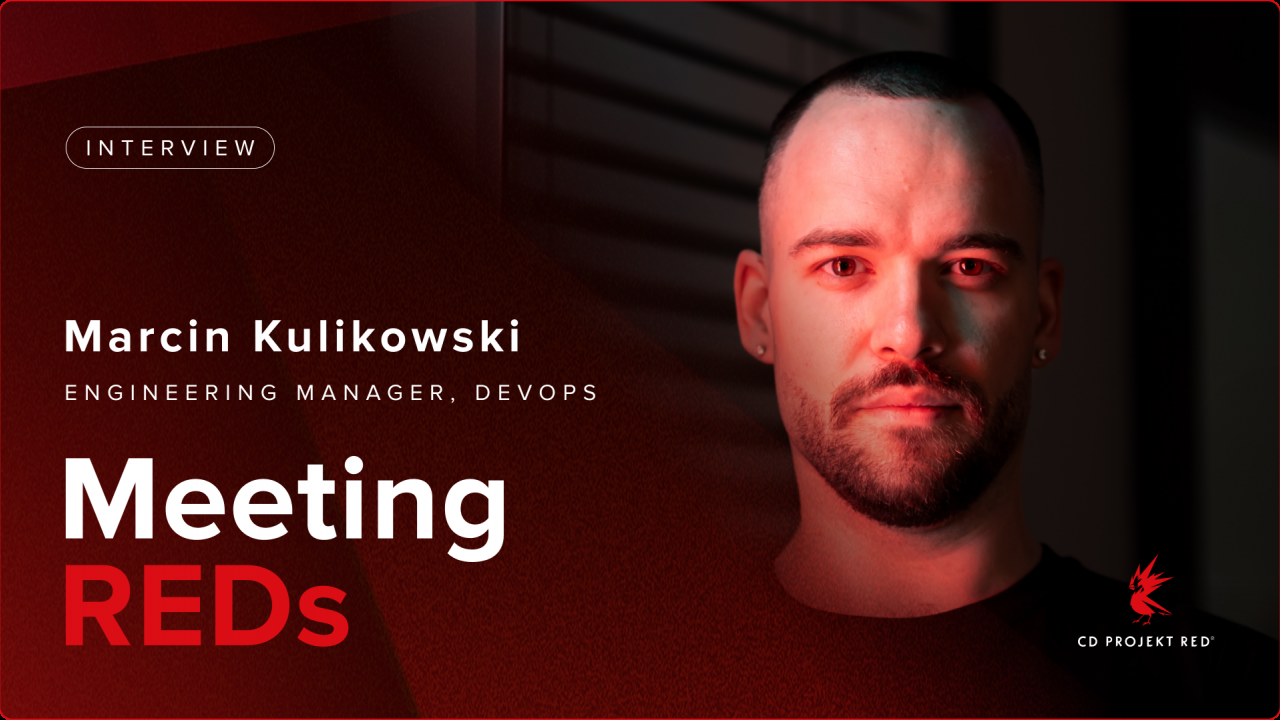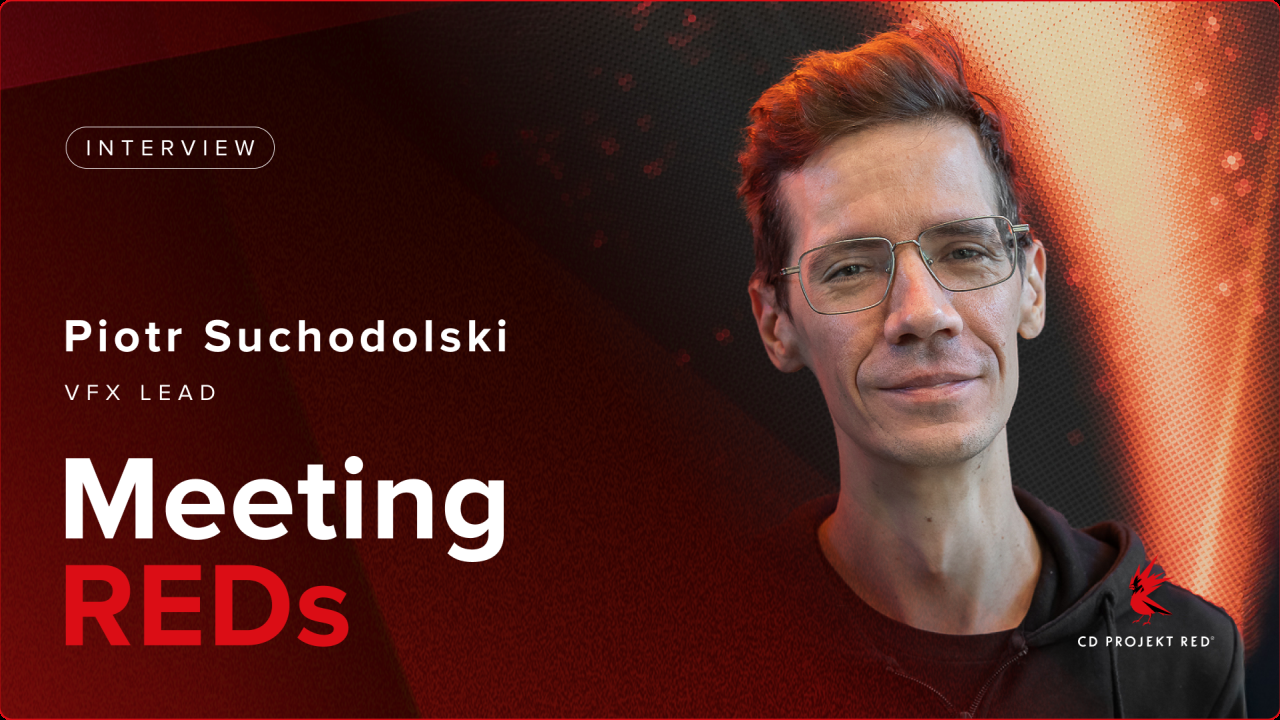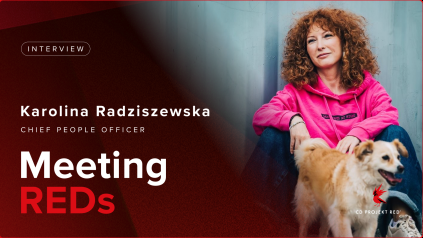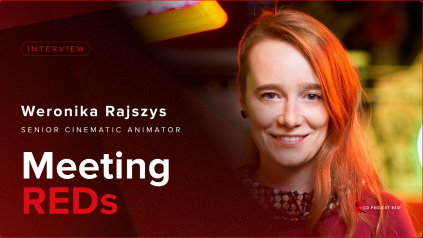The Developers Behind the Developers

As an Engineering Manager in the DevOps team, Marcin Kulikowski makes sure a lot of the development processes behind The Witcher and Cyberpunk 2077 go smoothly. And after 10 years at CD PROJEKT RED, he has a lot of fond memories to look back on.
What does the DevOps team do at CD PROJEKT RED?
We manage the CI/CD — Continuous Integration/Continuous Delivery — system, the build system used with every project for creating and deploying builds and running different kinds of automations and pipelines. We also provide a lot of developer services that enable and streamline developers’ work. There's a lot of services that allow developers to work most efficiently.
How did you get started at CD PROJEKT RED?
I started as a Junior Tech Support representative for the upcoming The Witcher 3: Wild Hunt. I was hired on March 16, 2015, two months before The Witcher 3 came out. It's actually a pretty funny story, how I was employed, because before working in game dev I was working mostly in coffee businesses. But I wasn’t really into it long term. I didn't want it to be my job forever.
I started thinking I should be doing something that I enjoy, something that I'm interested in. And games were always a huge part of my life. I knew about The Witcher and I actually played the first game and The Witcher 2: Assassins of Kings. I started thinking about what companies were making games, and knowing The Witcher 3 was coming up, I landed at the CDPR website. I didn’t find any job listing that would even remotely be good for me because I had zero experience at the time, but I thought, ‘What the hell?’ I sent an open letter saying hello and that I was open to cooperating on anything at all. And after three days a recruiter called me and said they may have an opening for me. I went to the office for a couple of interviews and was hired as a Junior Tech Support rep.
To me, it’s a good story about not really looking at the limitations, or thinking that something isn’t possible. If I tried and it didn’t work then fine, but if I didn’t try I wouldn’t be here right now.
How long were you in technical support?
I worked with the Technical Support team for six months, I think, and during that time I learned a lot about the ins and outs of the game engine and the game itself, the debugging and stuff, to the point where Quality Assurance proposed that I move to their team. So I started working with what was called the Narrative QA team, mostly doing work on The Witcher 3 expansion Blood and Wine, things like quests and locations QA. And then after it was released, at the beginning of the actual production of Cyberpunk 2077, I moved to the Tech QA team because I had this fascination with the technical game aspect; it was more appealing. So I was again in a junior position. At the time there was this joke that I would just progress horizontally throughout the company as a junior until I was a junior member of the board. Thankfully I progressed upward inside Tech QA and was promoted to specialist, and during that time my interest in programming grew even more. It was at this point I cooperated with the DevOps team for the first time.
How did you get into the DevOps team?
One of the DevOps team members, Mateusz Byszkowski, suggested I try applying for a position on their team, and I did, and I passed… Again for the junior position, as an engineer. But over the course of Cyberpunk 2077’s development I climbed the whole ladder from specialist to senior, and after senior I became the Engineering Manager, and I’ve already been in this position for two years.
Is collaboration between teams important at CD PROJEKT RED?
Definitely. I think if it’s possible anywhere, it’s possible at CD PROJEKT RED. We have a lot of cross-team cooperation and possibilities for cross-team knowledge sharing. If you want to learn something you can just go ahead and ask people about it. If somebody is really good at this one thing or they really want to engage in this one subject, and they prove that they can do it, I think that it's very much possible for them to pursue these passions within the company.
After exploring different routes, what skills made you a good fit for DevOps?
You definitely have to be very willing to pursue new solutions. The status quo doesn't really exist. You have to be very open-minded about the situations you encounter, you have to look for outside the box solutions, and you often have to remain calm when things get a little chaotic! You are this pillar of stability for people who come to you, and they seek answers because very often our DevOps software engineers are not only people who just produce code or services… They also influence pipelines and they influence the culture of how we think about these processes.
You need this little leadership vein, even if you are not specifically in a leadership position. You need to be willing and able to take ownership of the topic you are involved in. It's very important that you stay on top of the situation, understand what's going on, and are able to constantly observe, feedback, and course correct. Because very often people will rely on you and they will expect you to have this insight or even sometimes a final say in how things should be done. I’m lucky to work in a team that has a strong sense of responsibility here. We believe that, if you're involved in something, it's not just about doing your tasks and ticking off boxes. It’s about making sure the process you are involved in actually works, from start to finish.
Do you think game development DevOps differs from more traditional DevOps?
They have a lot of connection points and a lot of similarities, but game DevOps has a lot of its own requirements and a lot of its own challenges which are unique to the domain. Traditional DevOps typically follows the standard cycle of deploy, test, release. In our team's case, we have a lot of development services to maintain, and this is something that traditional DevOps teams usually don't do much of. Maybe it's more related to some microservices or cloud infrastructure but they usually don't create such huge, full-fledged portals, for example.
That's one of the specifics of game dev. The other thing I would say is that not every DevOps team develops and maintains their own CI/CD system. They usually use something which is available on the market, which again is more designed towards standard software development that doesn't have as many complex steps as developing games. Usually with creating a game, and especially a CDPR game, you will need a lot of flexibility and influence over how the tooling works, and with an in-house system it's much easier because we can do whatever we want. Whatever is requested, we can think of a way to make this possible. We’re thankfully supported by our sister team of IT DevOps, led by Łukasz Wyszyński, who provide us with absolutely great support on the more traditional DevOps side. I really enjoy that cooperation.
What else do you enjoy about the job?
A lot of the technical parts of it, and the ability to really create something which is amazingly intelligent and complex. For example, the pipelines I created for Cyberpunk 2077 can still be used to create updates to the game and for new platform development like Nintendo Switch™ 2 and Mac. This all holds up, so we can expand our work with just slight adjustments accounting for new platforms and those specificities. It's super satisfying.
What are your favorite moments after 10 years at CD PROJEKT RED?
Launches always have a significant impact on me. The Witcher 3, for example, I’d only been at CD PROJEKT RED for two months so it was this completely unburdened joy, being able to take part in something so great and important to the history of video game development. And then my current team worked on The Witcher 3 on Nintendo Switch™ and on the Next-Gen update. The first time I was working on The Witcher 3 I was testing the consoles and this time I was actually working on the whole release. It was a cool full circle moment, looking through both sides of the mirror.
Thank you Marcin, and congratulations on 10 years at CD PROJEKT RED. Here’s to your next milestone!




























